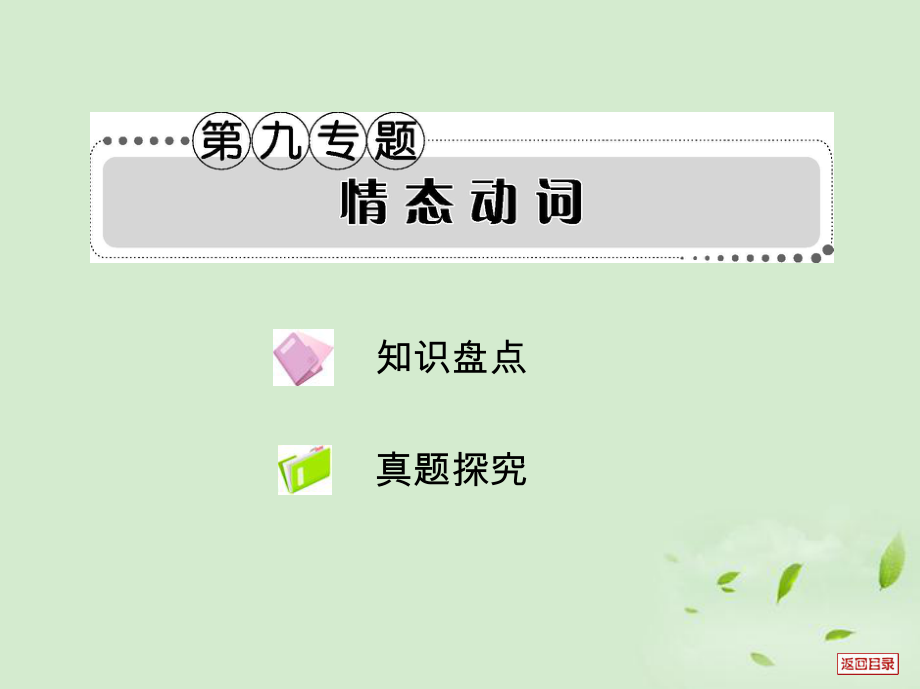




版權(quán)說(shuō)明:本文檔由用戶提供并上傳,收益歸屬內(nèi)容提供方,若內(nèi)容存在侵權(quán),請(qǐng)進(jìn)行舉報(bào)或認(rèn)領(lǐng)
文檔簡(jiǎn)介
1、知識(shí)盤(pán)點(diǎn)真題探究 情態(tài)動(dòng)詞近幾年的考查趨勢(shì):有效信息越來(lái)越隱蔽;情景越來(lái)越生動(dòng)、真實(shí);考查的角度越來(lái)越細(xì)化、綜合化。知識(shí)盤(pán)點(diǎn)知識(shí)盤(pán)點(diǎn)真題探究真題探究情態(tài)動(dòng)詞近幾年的考查要點(diǎn):1. 情態(tài)動(dòng)詞的基本用法,要求考生準(zhǔn)確把握說(shuō)話者的態(tài)度和語(yǔ)氣。2. 情態(tài)動(dòng)詞表示推測(cè)和可能性,特別是“情態(tài)動(dòng)詞+ have done”形式。3. “can, shall, should, must”表示的特定語(yǔ)氣。4. “should / neednt / could / might + have done”表示的特定語(yǔ)氣。一、情態(tài)動(dòng)詞的基本用法考點(diǎn)1can與could的用法表示“能力、許可、可能性”等。在口語(yǔ)中, can
2、可以代替may表示許可,而may比較正式;could可以代替can, 語(yǔ)氣較為婉轉(zhuǎn)。He is only four, but he can read. 他僅四歲,但已能讀書(shū)。Can / Could I come in? 我可以進(jìn)來(lái)嗎?Can he be in the office? 他會(huì)在辦公室嗎?考點(diǎn)2can表示常有的行為和情形知識(shí)盤(pán)點(diǎn)知識(shí)盤(pán)點(diǎn)真題探究真題探究can 表示常有的行為和情形,意為“有時(shí)會(huì);時(shí)而可能”。He can be very tactless sometimes. 他有時(shí)莽撞。It can be quite cold here in winter. 這里的冬天有時(shí)還真夠冷的
3、。考點(diǎn)3be able to的用法1.表示現(xiàn)在的能力等同于can, 表示過(guò)去的能力等同于could;be able to可以用在will后邊,也可以用于完成時(shí)(have been able to)。He was able to / could drive when he was fifteen. 他十五歲時(shí)就會(huì)開(kāi)車(chē)。知識(shí)盤(pán)點(diǎn)知識(shí)盤(pán)點(diǎn)真題探究真題探究The baby has been able to walk. 這個(gè)嬰兒已經(jīng)會(huì)走路了。2.was / were able to表示過(guò)去有能力并且成功地做了某事,相當(dāng)于managed to do something / succeeded in doi
4、ng something。The fire spread through the hotel very quickly but everyone was able to get out. 大火很快蔓延到整個(gè)賓館,但是大家都跑了出來(lái)。考點(diǎn)4may與might的用法1.表示許可或征詢對(duì)方許可,有“可以”的意思。用作此意時(shí),它的否定形式可以用may not, 表示“可以不”;但表示“不可以、禁止、阻止”等意思時(shí),常用must not (mustnt)代替may not。知識(shí)盤(pán)點(diǎn)知識(shí)盤(pán)點(diǎn)真題探究真題探究You may go now. 你現(xiàn)在可以走了。He said that I might use h
5、is telephone. 他說(shuō)我可以用他的電話。May I watch TV after supper?我晚飯后可以看電視嗎?Yes, you may. / No, you mustnt (may not / had better not).是的,可以。/不,你不可以。2.表示可能性,有“或許、可能”的意思,“may或might +動(dòng)詞原形”都表示可能性。用might則語(yǔ)氣更加不肯定。They may / might have a lot of work to do.他們可能有很多工作要做知識(shí)盤(pán)點(diǎn)知識(shí)盤(pán)點(diǎn)真題探究真題探究。考點(diǎn)5must與have to的用法1.must表示“必須、應(yīng)該”。否
6、定形式must not (mustnt)表示“不應(yīng)該;不許可;不準(zhǔn);禁止”等。在回答must的問(wèn)句時(shí),否定式常用need not (neednt)或dont have to 表示“不必”,而不用must not, 因?yàn)閙ust not表示“禁止”。The work must be finished as soon as possible. 這項(xiàng)工作必須盡快完成。Must I be home before eight oclock? 我必須8點(diǎn)前到家嗎?知識(shí)盤(pán)點(diǎn)知識(shí)盤(pán)點(diǎn)真題探究真題探究Yes, you must. / No, you neednt (dont have to). 是的,你必須。/
7、不,沒(méi)必要。2.have to表示“必須;不得不”,在這個(gè)意義上與must很接近,但must表示的是說(shuō)話人的主觀看法,而have to表示的卻是客觀需要。have to比must有更多的形式。The TV set is broken. I have to buy a new one. 電視機(jī)壞了。我不得不再買(mǎi)臺(tái)新的。He had to go, because his mother was ill. 他不得不離開(kāi),因?yàn)樗赣H病了。知識(shí)盤(pán)點(diǎn)知識(shí)盤(pán)點(diǎn)真題探究真題探究3.must表示“偏偏;非得;一定要”等意思。If you must go, at least wait until the storm
8、 is over. 如果你一定要走的話,起碼也要等到暴風(fēng)雨結(jié)束。考點(diǎn)6need的用法用作情態(tài)動(dòng)詞時(shí),need表示“需要”,主要用于疑問(wèn)句、否定句和條件狀語(yǔ)從句中,一般不用于肯定句。在回答need的問(wèn)句時(shí),肯定式常用must / have to,否定式用neednt。Need I arrive by ten oclock tomorrow? 我明天必須在十點(diǎn)前到達(dá)嗎?知識(shí)盤(pán)點(diǎn)知識(shí)盤(pán)點(diǎn)真題探究真題探究Yes, you must. / No, you neednt. 是的,你必須。/不,沒(méi)必要。You neednt come so early tomorrow. 你明天不必來(lái)這么早。考點(diǎn)7shall
9、的用法1.在疑問(wèn)句中,shall用來(lái)征詢對(duì)方意見(jiàn)或請(qǐng)求指示,用于第一、第三人稱。Where shall I wait for you? 我在什么地方等你?2.在陳述句中,shall表示給對(duì)方的命令、警告、威脅、決心或允諾等,用于第二、第三人稱。知識(shí)盤(pán)點(diǎn)知識(shí)盤(pán)點(diǎn)真題探究真題探究You shall be sorry one day, I tell you. 我告訴你,你早晚有一天會(huì)后悔的。Dont worry. You shall get the answer this very afternoon. 不要焦急,今天下午你就會(huì)得到答復(fù)。3.用在法律、規(guī)則等條文中,意為“應(yīng);須;得”。The fin
10、e shall be given in cash. 罰款應(yīng)以現(xiàn)金繳納。It shall be unlawful for any person to keep any wild animal in captivity. 任何一個(gè)人圈養(yǎng)任何一種野生動(dòng)物都是犯法的。知識(shí)盤(pán)點(diǎn)知識(shí)盤(pán)點(diǎn)真題探究真題探究考點(diǎn)8should和ought to的用法1.表示“勸告、建議、責(zé)任、義務(wù)”,常譯作“應(yīng)該”。這時(shí)ought to比should的語(yǔ)氣稍重一點(diǎn)。You should keep your promise. 你應(yīng)該信守諾言。Young people should learn how to use compute
11、rs. 年輕人應(yīng)該學(xué)會(huì)使用電腦。You are his father. You ought to take care of him. 你是他父親,你應(yīng)該照顧他。知識(shí)盤(pán)點(diǎn)知識(shí)盤(pán)點(diǎn)真題探究真題探究2.表示預(yù)期或按道理“應(yīng)該;想必;一定”。The photos should be ready by 12:00。照片應(yīng)該在十二點(diǎn)前準(zhǔn)備好。You should know him well, for you worked with him for years. 你應(yīng)該很了解他,你和他在一塊兒工作了好幾年。考點(diǎn)9will的用法1.will表示“意志、意愿”,可用于多種人稱;would是will的過(guò)去式,表示
12、過(guò)去時(shí)間的“意志、意愿”,可用于多種人稱。I will tell you all about it. 我愿把事情全部都告訴你。知識(shí)盤(pán)點(diǎn)知識(shí)盤(pán)點(diǎn)真題探究真題探究He wont go with us. 他不愿和我們一起去。2.will在疑問(wèn)句中用于第二人稱時(shí),表示詢問(wèn)對(duì)方的意愿或向?qū)Ψ教岢稣?qǐng)求, 若用would, 語(yǔ)氣比will婉轉(zhuǎn),指現(xiàn)在時(shí)間。Will / Would you please open the window? 你把窗戶打開(kāi)好嗎?Would you like some coffee? 想要點(diǎn)咖啡嗎?考點(diǎn)10dare的用法用作情態(tài)動(dòng)詞時(shí),表示“敢;敢于”,和need一樣,也是主要用于疑
13、問(wèn)句、否定句和條件從句中。知識(shí)盤(pán)點(diǎn)知識(shí)盤(pán)點(diǎn)真題探究真題探究He darent speak English before such a crowd, dare he? 他在眾人面前不敢說(shuō)英語(yǔ),是吧?考點(diǎn)11used to和would的用法1.used to表示過(guò)去的習(xí)慣動(dòng)作或狀態(tài)(暗示現(xiàn)在已不如此)。Did you use to go there to see your brother? / Used you to go there to see your brother? 你過(guò)去常去那兒看你兄弟嗎?Yes, I did (used to). / No, I didnt (usednt). 是的
14、,經(jīng)常去。/不,不經(jīng)常去。知識(shí)盤(pán)點(diǎn)知識(shí)盤(pán)點(diǎn)真題探究真題探究He used to be in good health. 他過(guò)去的身體很棒。(暗示現(xiàn)在身體不好了)2.would表示過(guò)去的習(xí)慣動(dòng)作,不表示狀態(tài)。When he was there, he would go to that coffee shop at the corner after work every day. 他在那里的時(shí)候,每天下班之后就去拐角處的那家咖啡店。used to表示動(dòng)作時(shí)和would可以互換,他們的區(qū)別在于,used to強(qiáng)調(diào)現(xiàn)在已不這樣;而would則不強(qiáng)調(diào)現(xiàn)在是否這樣。They would / used to
15、come to my house to play on Sundays.他們過(guò)去知識(shí)盤(pán)點(diǎn)知識(shí)盤(pán)點(diǎn)真題探究真題探究在星期天經(jīng)常來(lái)我家玩耍。考點(diǎn)12had better的用法Had better表示“最好(做)”。We had better go now. 我們最好現(xiàn)在走。Breakfast had better be eaten before 8 oclock. 吃早飯最好在八點(diǎn)以前。考點(diǎn)13may well和may as well1.“may well +動(dòng)詞原形”是一種常用結(jié)構(gòu),意為“很可能;完全能知識(shí)盤(pán)點(diǎn)知識(shí)盤(pán)點(diǎn)真題探究真題探究”,相當(dāng)于to be likely to。He may wel
16、l be proud of his son. 他大可為兒子感到自豪。Her appearance has changed so much that you may well not recognize her. 她的模樣變化太大,你很可能認(rèn)不出她來(lái)了。2.“may as well +動(dòng)詞原形”意為“最好;滿可以;倒不如”,相當(dāng)于had better或have a strong reason not to。We may as well stay where we are. 我們留在現(xiàn)在的地方倒也不錯(cuò)。You may as well do it at once. 你最好馬上做這件事。知識(shí)盤(pán)點(diǎn)知識(shí)盤(pán)
17、點(diǎn)真題探究真題探究二、情態(tài)動(dòng)詞的特殊用法考點(diǎn)1情態(tài)動(dòng)詞表示推測(cè)情態(tài)動(dòng)詞must, can / could, may / might可以用來(lái)對(duì)事情進(jìn)行推測(cè)。must表推測(cè)時(shí)只用于肯定句,語(yǔ)氣非常肯定,譯為“一定”。can / could表推測(cè)時(shí)一般用于否定句或疑問(wèn)句,could偶爾可以用于肯定句。may / might表推測(cè)時(shí)可用于肯定句或否定句。1.“情態(tài)動(dòng)詞+do / be”結(jié)構(gòu),通常對(duì)現(xiàn)在或?qū)?lái)的情況進(jìn)行推測(cè)。Its already 12: 30. You must be hungry now. 已經(jīng)十二點(diǎn)半了,你現(xiàn)在一定餓了。知識(shí)盤(pán)點(diǎn)知識(shí)盤(pán)點(diǎn)真題探究真題探究The light is st
18、ill on. He must be working in the office now. 燈還亮著,他現(xiàn)在一定還在辦公室工作著。He may be in the classroom. Ill go and make sure. 他或許還在教室里,我去弄弄清楚。Michael cant be a policeman, for hes much too short. 麥克不可能成為警察,因?yàn)樗恕?.“情態(tài)動(dòng)詞+ have done”結(jié)構(gòu)用于對(duì)過(guò)去事情的推測(cè)。I didnt hear the phone. I must have been asleep. 我當(dāng)時(shí)沒(méi)聽(tīng)到電話響,我一定是睡著了。
19、知識(shí)盤(pán)點(diǎn)知識(shí)盤(pán)點(diǎn)真題探究真題探究Tom hasnt come back yet. He may have missed the bus again. 湯姆還沒(méi)有回來(lái),他可能又沒(méi)趕上班車(chē)。Jack cant have arrived yet; otherwise he would have telephoned me. 杰克不可能來(lái)了,否則,他會(huì)給我打電話的。考點(diǎn)2情態(tài)動(dòng)詞表責(zé)備語(yǔ)氣情態(tài)動(dòng)詞should / ought to, could, might, neednt等常用來(lái)表示說(shuō)話人對(duì)過(guò)去事情的不滿或遺憾,帶有較強(qiáng)烈的責(zé)備語(yǔ)氣。1.should / ought to have done“本應(yīng)該
20、”,表示過(guò)去應(yīng)該做而實(shí)際沒(méi)有做的事情,含有責(zé)備或遺憾的語(yǔ)氣,其否定形式為“should not知識(shí)盤(pán)點(diǎn)知識(shí)盤(pán)點(diǎn)真題探究真題探究 / ought not to have done”。We should have studied last night, but we went to the concert instead. 我們昨晚本應(yīng)該學(xué)習(xí),卻去看了音樂(lè)會(huì)。I was really anxious about you. You shouldnt have left home without a word. 我當(dāng)時(shí)真的很為你擔(dān)心。你不該一句話不說(shuō)就離家出走。2.neednt have done“本
21、來(lái)不需要”,表示過(guò)去本來(lái)沒(méi)必要做某事,但事實(shí)上卻做了。There was plenty of time. She neednt have hurried. 當(dāng)時(shí)時(shí)間很充足,她沒(méi)有必要那么匆忙。知識(shí)盤(pán)點(diǎn)知識(shí)盤(pán)點(diǎn)真題探究真題探究3.could / might have done“本來(lái)能夠 (會(huì))”,表示過(guò)去本來(lái)可以(能夠)做某事,但實(shí)際上沒(méi)有做到。I stayed at a hotel while in New York. 在紐約時(shí)我住在了一家賓館里。Oh, did you? You could have stayed with my brother. 是嗎?你本來(lái)是可以和我弟弟住在一起的。考點(diǎn)3
22、情態(tài)動(dòng)詞表示意外、驚訝、納悶等意思1.“should +動(dòng)詞原形”表示對(duì)現(xiàn)在的情況感到意外。知識(shí)盤(pán)點(diǎn)知識(shí)盤(pán)點(diǎn)真題探究真題探究I find it astonishing that he should be so rude to you. 他竟然對(duì)你這樣無(wú)禮,真叫我吃驚。2.“should + have done”表示過(guò)去的情況感到意外。The meeting was very important. You should have arrived so late. 會(huì)議非常重要。你竟然去得那么晚。3.can, dare, should, need與疑問(wèn)詞連用,表示意外、納悶、驚訝等意思。How /
23、 Why can you be so stupid? 你怎么會(huì)這么笨呢?How dare you say that? 你怎么敢這樣說(shuō)呢?Why should you think that way? 你到底為什么那么想?知識(shí)盤(pán)點(diǎn)知識(shí)盤(pán)點(diǎn)真題探究真題探究 1.(2011全國(guó)新課標(biāo)) They have arrived at lunchtime but their flight was delayed. A.will B.can C.must D.should【答案與解析】D句意:他們本應(yīng)該午餐時(shí)間到達(dá),可是他們的飛機(jī)晚點(diǎn)了。can / must have done表示對(duì)過(guò)去的推測(cè);should have done表示過(guò)去本應(yīng)該做而沒(méi)有做。根據(jù)句意可知答案為D項(xiàng)。知識(shí)盤(pán)點(diǎn)知識(shí)盤(pán)點(diǎn)真題探究真題探究2.(2011全國(guó)) If you smoke, please go outside.A.can B.should C
溫馨提示
- 1. 本站所有資源如無(wú)特殊說(shuō)明,都需要本地電腦安裝OFFICE2007和PDF閱讀器。圖紙軟件為CAD,CAXA,PROE,UG,SolidWorks等.壓縮文件請(qǐng)下載最新的WinRAR軟件解壓。
- 2. 本站的文檔不包含任何第三方提供的附件圖紙等,如果需要附件,請(qǐng)聯(lián)系上傳者。文件的所有權(quán)益歸上傳用戶所有。
- 3. 本站RAR壓縮包中若帶圖紙,網(wǎng)頁(yè)內(nèi)容里面會(huì)有圖紙預(yù)覽,若沒(méi)有圖紙預(yù)覽就沒(méi)有圖紙。
- 4. 未經(jīng)權(quán)益所有人同意不得將文件中的內(nèi)容挪作商業(yè)或盈利用途。
- 5. 人人文庫(kù)網(wǎng)僅提供信息存儲(chǔ)空間,僅對(duì)用戶上傳內(nèi)容的表現(xiàn)方式做保護(hù)處理,對(duì)用戶上傳分享的文檔內(nèi)容本身不做任何修改或編輯,并不能對(duì)任何下載內(nèi)容負(fù)責(zé)。
- 6. 下載文件中如有侵權(quán)或不適當(dāng)內(nèi)容,請(qǐng)與我們聯(lián)系,我們立即糾正。
- 7. 本站不保證下載資源的準(zhǔn)確性、安全性和完整性, 同時(shí)也不承擔(dān)用戶因使用這些下載資源對(duì)自己和他人造成任何形式的傷害或損失。
最新文檔
- 2025年餐館開(kāi)業(yè)促銷(xiāo)活動(dòng)方案
- 2025年企業(yè)年會(huì)精彩活動(dòng)策劃方案
- 2025年醫(yī)院院務(wù)公開(kāi)實(shí)施方案
- 2025年幼兒園畢業(yè)典禮活動(dòng)方案流程
- 2025年學(xué)校憲法日活動(dòng)方案
- 大班班務(wù)2025年方案演講稿
- 尾椎脫位CT診斷
- 80后人群的特點(diǎn)和領(lǐng)導(dǎo)方法探討
- 內(nèi)蒙古交通職業(yè)技術(shù)學(xué)院《移動(dòng)開(kāi)發(fā)技術(shù)及應(yīng)用》2023-2024學(xué)年第二學(xué)期期末試卷
- 武夷學(xué)院《衛(wèi)生檢驗(yàn)實(shí)驗(yàn)方法與技能(免疫學(xué)檢驗(yàn)實(shí)驗(yàn))》2023-2024學(xué)年第一學(xué)期期末試卷
- 本科大學(xué)生勞動(dòng)教育理論與實(shí)踐教程第三章 教學(xué)課件
- 近代以來(lái)廣州外貿(mào)產(chǎn)業(yè)的發(fā)展歷程
- 29《馬說(shuō)》2022中考語(yǔ)文文言文閱讀復(fù)習(xí)精選真題匯編(原卷版+解析版)
- DBJ04-T 410-2021城市停車(chē)場(chǎng)(庫(kù))設(shè)施配置標(biāo)準(zhǔn)
- 車(chē)站主體結(jié)構(gòu)模板支架專項(xiàng)施工方案--終稿(專家意見(jiàn)修改的)-副本
- 景觀環(huán)境與行為特征
- 保潔崗位培訓(xùn)
- 小學(xué)美術(shù)國(guó)測(cè)(國(guó)家義務(wù)教育質(zhì)量監(jiān)測(cè))復(fù)習(xí)內(nèi)容
- 麗聲北極星自然拼讀繪本第二級(jí) Pad, Pad, Pad! 課件
- meta分析范文展示
- 110kV升壓站電氣設(shè)備調(diào)試方案

評(píng)論
0/150
提交評(píng)論